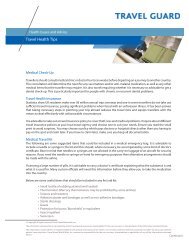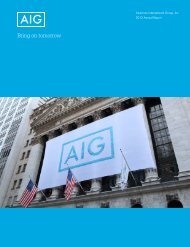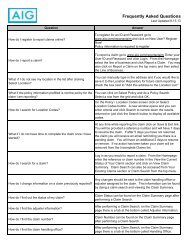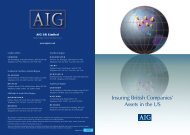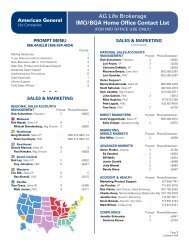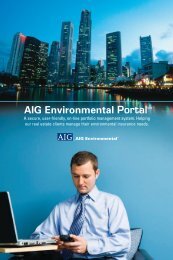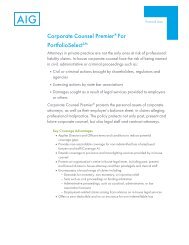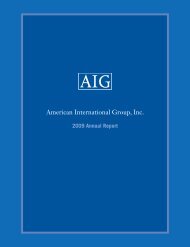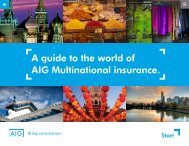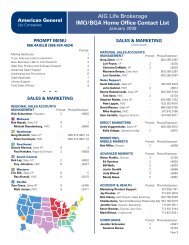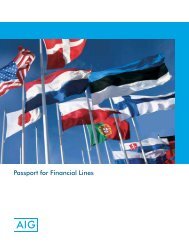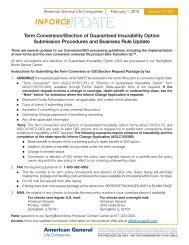2007 Annual Report - AIG.com
2007 Annual Report - AIG.com
2007 Annual Report - AIG.com
Create successful ePaper yourself
Turn your PDF publications into a flip-book with our unique Google optimized e-Paper software.
American International Group, Inc. and Subsidiaries<br />
surplus by applying certain factors to various asset, premium and<br />
reserve items. Higher factors are applied to more risky items and<br />
lower factors are applied to less risky items. Thus, the target level<br />
of statutory surplus varies not only as a result of the insurer’s<br />
size, but also based on the risk profile of the insurer’s operations.<br />
The RBC Model Law provides for four incremental levels of<br />
regulatory attention for insurers whose surplus is below the<br />
calculated RBC target. These levels of attention range in severity<br />
from requiring the insurer to submit a plan for corrective action to<br />
placing the insurer under regulatory control.<br />
The statutory surplus of each of <strong>AIG</strong>’s Domestic General<br />
Insurance and Life Insurance subsidiaries exceeded their RBC<br />
target levels as of December 31, <strong>2007</strong>.<br />
To the extent that any of <strong>AIG</strong>’s insurance entities would fall<br />
below prescribed levels of statutory surplus, it would be <strong>AIG</strong>’s<br />
intention to provide appropriate capital or other types of support<br />
to that entity.<br />
A substantial portion of <strong>AIG</strong>’s General Insurance business and<br />
a majority of its Life Insurance business is carried on in foreign<br />
countries. The degree of regulation and supervision in foreign<br />
jurisdictions varies. Generally, <strong>AIG</strong>, as well as the underwriting<br />
<strong>com</strong>panies operating in such jurisdictions, must satisfy local<br />
regulatory requirements. Licenses issued by foreign authorities to<br />
<strong>AIG</strong> subsidiaries are subject to modification or revocation by such<br />
authorities, and these subsidiaries could be prevented from<br />
conducting business in certain of the jurisdictions where they<br />
currently operate. In the past, <strong>AIG</strong> has been allowed to modify its<br />
operations to conform with new licensing requirements in most<br />
jurisdictions.<br />
In addition to licensing requirements, <strong>AIG</strong>’s foreign operations<br />
are also regulated in various jurisdictions with respect to currency,<br />
policy language and terms, advertising, amount and type of<br />
security deposits, amount and type of reserves, amount and type<br />
of capital to be held, amount and type of local investment and the<br />
share of profits to be returned to policyholders on participating<br />
policies. Some foreign countries regulate rates on various types of<br />
policies. Certain countries have established reinsurance institutions,<br />
wholly or partially owned by the local government, to which<br />
admitted insurers are obligated to cede a portion of their<br />
business on terms that may not always allow foreign insurers,<br />
including <strong>AIG</strong> subsidiaries, full <strong>com</strong>pensation. In some countries,<br />
regulations governing constitution of technical reserves and<br />
remittance balances may hinder remittance of profits and repatriation<br />
of assets.<br />
See Management’s Discussion and Analysis of Financial<br />
Condition and Results of Operations — Capital Resources and<br />
Liquidity — Regulation and Supervision and Note 15 to Consolidated<br />
Financial Statements.<br />
Competition<br />
<strong>AIG</strong>’s Insurance, Financial Services and Asset Management<br />
businesses operate in highly <strong>com</strong>petitive environments, both<br />
domestically and overseas. Principal sources of <strong>com</strong>petition are<br />
insurance <strong>com</strong>panies, banks, investment banks and other nonbank<br />
financial institutions.<br />
The insurance industry in particular is highly <strong>com</strong>petitive.<br />
Within the United States, <strong>AIG</strong>’s General Insurance subsidiaries<br />
<strong>com</strong>pete with approximately 3,400 other stock <strong>com</strong>panies, spe-<br />
cialty insurance organizations, mutual <strong>com</strong>panies and other<br />
underwriting organizations. <strong>AIG</strong>’s subsidiaries offering Life Insurance<br />
& Retirement Services <strong>com</strong>pete in the United States with<br />
approximately 2,100 life insurance <strong>com</strong>panies and other participants<br />
in related financial services fields. Overseas, <strong>AIG</strong> subsidiar-<br />
ies <strong>com</strong>pete for business with foreign insurance operations of the<br />
larger U.S. insurers, global insurance groups and local <strong>com</strong>panies<br />
in particular areas in which they are active.<br />
Directors and Executive Officers of <strong>AIG</strong><br />
All directors of <strong>AIG</strong> are elected for one-year terms at the annual<br />
meeting of shareholders. All executive officers are elected to one-<br />
year terms, but serve at the pleasure of the Board of Directors.<br />
Except as hereinafter noted, each of the executive officers has,<br />
for more than five years, occupied an executive position with <strong>AIG</strong><br />
or <strong>com</strong>panies that are now its subsidiaries. Other than the<br />
employment contracts between <strong>AIG</strong> and Messrs. Sullivan and<br />
Bensinger, there are no other arrangements or understandings<br />
between any executive officer and any other person pursuant to<br />
which the executive officer was elected to such position. From<br />
January 2000 until joining <strong>AIG</strong> in May 2004, Dr. Frenkel served as<br />
Chairman of Merrill Lynch International, Inc. Prior to joining <strong>AIG</strong> in<br />
September 2006, Ms. Kelly served as Executive Vice President<br />
and General Counsel of MCI/WorldCom. Previously, she was<br />
Senior Vice President and General Counsel of Sears, Roebuck and<br />
Co. from 1999 to 2003. From June 2004 until joining <strong>AIG</strong> in May<br />
<strong>2007</strong>, Mr. Kaslow was a managing partner of QuanStar Group,<br />
LLC (an advisory services firm), and, from January 2002 until May<br />
2004, Mr. Kaslow was Senior Executive Vice President of Human<br />
Resources for Vivendi Universal (an entertainment and tele<strong>com</strong>mu-<br />
nications <strong>com</strong>pany).<br />
14 <strong>AIG</strong> <strong>2007</strong> Form 10-K



